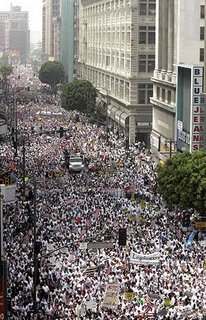The Real Labor Day
 (Photo by Luis Sinco of the LA Times)
(Photo by Luis Sinco of the LA Times)I had hoped to post about this before, but I've been dutifully neglecting my blog. Be that as it may, I hope everyone out there has shown solidarity with the protests today, either in person or virtually. Many american workers may think that immigrant workers pose a threat to their jobs. Often tensions are high between working class white workers and mexican workers, and in my community between mexican workers and black workers who are sometimes vying for the same jobs. However, we should remember that the fight for rights can never succeed if it is not all-encompassing. Remember what Marx said regarding the beginnings of the movement for the 8 hour work day in the United States: "In the United States of America, any sort of independent labor movement was paralyzed so long as slavery disfigured a part of the republic. Labor with a white skin cannot emancipate itself where labor with a black skin is branded." We would do well to remember this now. If "legal workers" want to see their labor cause strengthened, they must show solidarity with ALL workers.
I think of May 1st as the real Labor Day. Why May 1st? In 1889, the Second International declared May 1st as the day workers of the world would demand a shorter work day. This decision was directly inspired by the American Federation of Labor's resolution that the legal work day should be an 8 hour work day starting May 1st, 1886. What this amounted to, since, of course, that legal right had still to be fought for, was the plan for a massive worker strike on that day. The "Haymarket Affair" occurred on May 3rd and 4th of that year. It is probable May 1st was chosen as the day of strike because of the 1867 May 1st strike in Chicago, and because that time of year had traditionally become a time to fight for workers' rights. Because the American Federation of Labor had planned for another massive strike on May 1st, 1890, the Second International decided to adopt that day as well in its call for a workers' international demonstration for an 8 hour work day. Then, at its next congress, the Second International called for May 1st to be a day to demand worker rights in general, and to promote universal peace. Since the greatest potency of May 1st demonstrations was stopping work, reformists in many labor organizations urged moving the day of protest to the nearest Sunday. In fact, if you think about it, making Labor Day a national holiday is an intelligent way to co-opt it: how can the effect of a protest be felt if workers have the day off anyhow? A much stronger protest includes striking on the day, making the stoppage of work felt as profoundly as possible, making visible the otherwise invisible work done by billions of people.
Why is Labor Day celebrated in the US in September? There are various points of view. One is that after the Haymarket affair, the American Federation of Labor started becoming more conservative, and promoted celebrating Labor Day in September to draw attention away from the communist and socialist associations with May 1st. The September Labor Day was to be a day of rest and enjoyment, not protest. The federal government backed this move in 1894 after several state legislatures had adopted the holiday, and to appease workers after the crushing of the Pullman strike. Another explanation attributes the September date to the New York Knights of Labor parade in September of 1882, or to its genesis in the plans of the Central Labor Union. What is clear is that May 1st was NOT chosen as a government holiday because the government and employers were eager to cover over its radical associations. In 1928, Calvin Coolidge declared May 1st "Child Health Day" to draw attention away from it as a day for worker protest and strike. Guess who's plea it was to make May 1st Child Health Day? The now-conservative American Federation of Labor. Later, Child Health Day was moved to the first Monday of October in 1960, and May 1st became instead "Law Day" (Eisenhower had declared May 1st, 1958 "Law Day - USA", and in 1961 Congress made it official). May 1st also happens to be "Loyalty Day." Hmm...interesting.
Personally, I'm glad May 1st is not officially Labor Day in the United States-it gives us a chance to make more of an impact on the day that is more commonly observed throughout the world. Hopefully today many of us will make a difference in our smaller or larger ways.